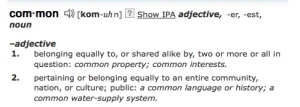This is one of the most inspiring youth digital compositions I’ve ever encountered. By Oakland Leaf Youth Roots, shown tonight at the 10th Anniversary All Oakland Youth Talent Showcase. The youth call themselves artivists – using art for social change.
Monthly Archives: May 2010
the commons
Continuing the New England theme from my last post …
Many communities in Massachusetts have a town common, a central green area that’s open and accessible to the public. Verdant, idyllic, what you might think of when you think of New England. Probably the most famous is the Boston Common, which even had a TV show named after it.
You might then think that a common is a kind of park. The City of Boston refers to it that way.
But the town common as a concept signifies much more than a place to throw a frisbee or walk your dog. In Western Massachusetts, for instance, the common – which was a carryover from England – originated as a publicly held green where all farmers could bring their livestock to graze. In other words, regardless of how much or how little pasture you owned, you had the right to bring your animals to the town-held common (also known as the town green).
I also associate the common with a town’s meeting house, which was usually close by, if not right on that central open space. The meeting house, if you recall from your fourth grade American history, was a structure used as a place for social and political discourse as well as for religious services.
Old South Meeting House in Boston says about itself:
Old South Meeting House has been an active gathering place for discussion and celebration and a haven for free speech in the heart of downtown Boston.
The common, then, and its associated meeting house was a place held open for the public good of all, as well as a venue for the free exchange of ideas – a civic space, a forum.
The town commons I’m familiar with in Western Massachusetts, where I lived for many years, are what I think of – physically and conceptually – when I hear the term “commons” used today, as in Creative Commons, the open license organization, or the website On The Commons.
According to On the Commons:
The commons is a new way to express a very old idea—that some forms of wealth belong to all of us, and that these community resources must be actively protected and managed for the good of all.
The commons are the things that we inherit and create jointly, and that will (hopefully) last for generations to come. The commons consists of gifts of nature such as air, oceans and wildlife as well as shared social creations such as libraries, public spaces, scientific research and creative works.
I would have said that this notion of a “commons” is actually an old way to express an old idea … in a new arena: the online domain. Despite the efforts of organizations such as Creative Commons and On the Commons, we see our digital commons under constant threat. Net neutrality is attacked by the telecoms. Facebook banks on the fact that you will view its space as a digital commons even as it erodes your control over your own words. The list is endless.
But this struggle is not new. Commons have since their origin in England faced the threat of enclosure, or the process of ending traditional rights. Here’s a protest poem from the 17th century in opposition to the enclosure of a village commons:
They hang the man and flog the woman
That steal the goose from off the common,
But let the greater villain loose
That steals the common from the goose.
The idea of a commons is as fundamental to our nation’s history, culture and ethos as, well, Boston’s Freedom Trail. Which by the way has as its starting point – you guessed it – the Boston Common.
Filed under digital literacies
trust
Spring and its abundance reminds me that I have not yet encountered a particular phenomenon in California.
There are farmstands here, of course. Particularly in the Central Valley, that wide swath of green that provides food to the nation. These farmstands are decorated with signs that trumpet “Pecans” or “Strawberries.” But you’ll always find a person there, ready to exchange produce for cash.
Back in Western Massachusetts, where I lived for more than a decade, I came to love the farmstand honor system. During corn season, especially, it was common to see a flat bed truck by the side of the road piled high with green husks. On a nearby table, you’d find a metal box with a slit on top and a padlock. Alongside it, a sign that might say “6 for $2, 12 for $3.75.”
You were expected to put your money in the box and take what you paid for. That was that.
I’ve always wondered what allowed for such a level of trust. Growing up in NYC, I sensed merchants feared all strangers, watching us kids with wary baleful eyes.
My friend, Elizabeth Graver, wrote a novel called The Honey Thief that if my
- (www.amazon.com)

memory serves me right is about a young girl from New York City, a girl who steals things, whose mom moves her to a small rural community to help her deal with these and other issues. The girl encounters a person-less farmstand with honey for sale and only a lockbox for money. And she finds this inconceivably naive.
These honor-system farmstands – sometimes a rough-hewn wooden stand in a clearing, sometimes a cart on the farm itself, but always hand-lettered signs pointing out the zucchini or the tomatos or the corn – were and continue to be a revelation to me.
They work, it seems, because they are part of that community’s social compact. Like Radiohead making its music available for download via a pay-what-you-want system. (Ok, that’s actually a bad example.) Or like the MET commuter rail in Portland in which you’re expected to buy a ticket but you’re not asked to put it through a turnstile to gain entry to the train, or give it to anyone for that matter.
Which makes me wonder: what allows for this kind of trust to become an accepted part of a community? Clearly, the monetary loss must not be too great. But is it simply a financial calculus?
Living in Western Massachusetts, I knew I didn’t want to jeopardize this belief that we had the ability to do the right thing without need of a stick or a carrot or a mediator. That somehow we were all elevated by my simple act of slipping the appropriate number of bills through the slit in the top of the metal box.
Filed under slow food

